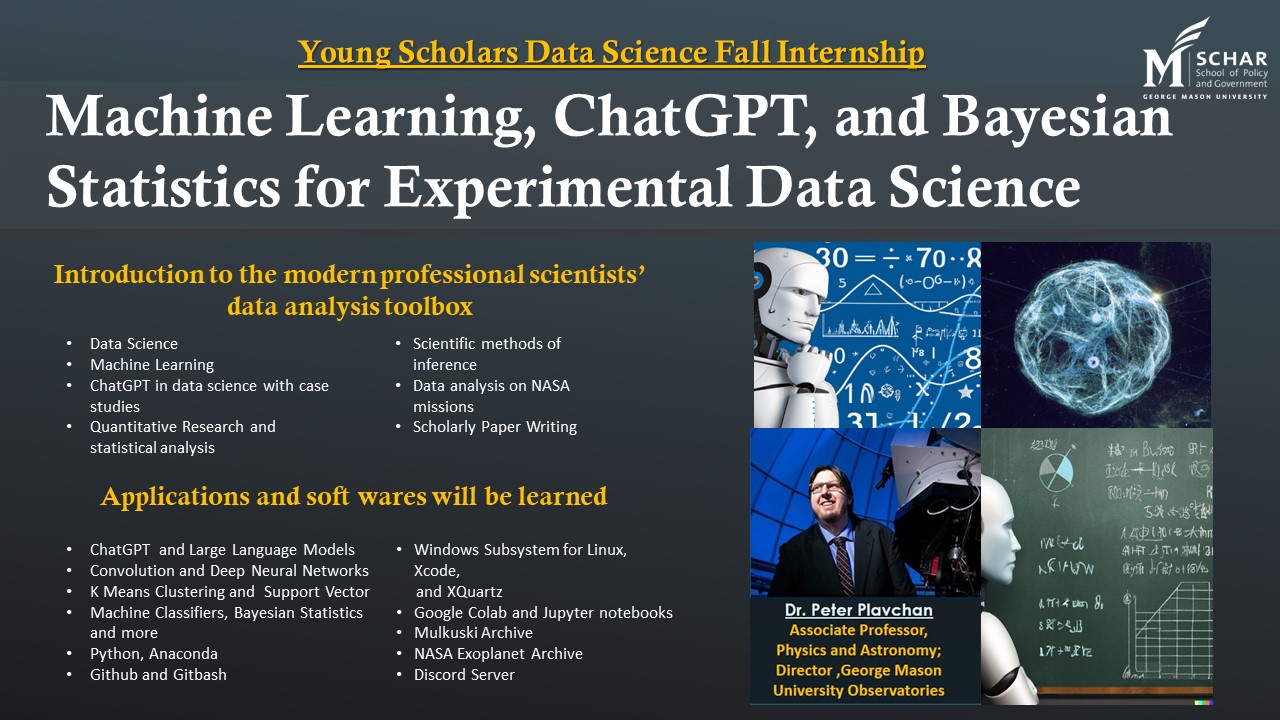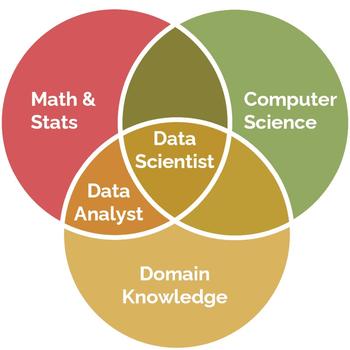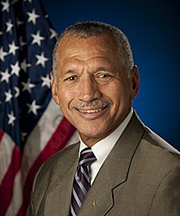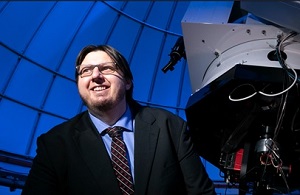Introduction to the modern professional scientists’ data analysis toolbox
Fall 2023
Department of Physics and Astronomy
College of Science and Schar School of Policy and Government
George Mason University
Location: Virtual and Mason Space Day on October 22nd, 2023
Course Dates: October 7 – December 18, 2023
The internship program consists of:
- Three Synchronous Virtual Meetings, Saturdays, noon to 2:00 p.m. EST; 9 a.m. to 11:00 a.m. PST;
- Saturday, October 7th, Opening; Introduction of the program and project studies
- Saturday, November 4th, Group discussion and feedback Day
- Saturday, December 2nd, Final Paper discussion day
- Three asynchronous study sessions: Our faculty team will release a recording of project instructions each week based on students' research progress.
With optional study:
- Virtual Office Hour/Group Discussions via Discord Server and Zoom by RSVP:
- Thursday, October 19th, 8 a.m. to 9 p.m. EDT, 5 to 6:00 p.m. PDT,
- Wednesday November 1st, 8 a.m. to 9:00 p.m. EDT, 5 to 6:00 p.m. PDT,
- Friday, November 17th, 8 a.m. to 9:00 p.m. EST, 5 to 6:00 p.m. PST, *Daylight saving starts on Nov 5th, 2023
- Wednesday, November 29th, 8 a.m. to 9:00 p.m. EST, 5 to 6:00 p.m. PST
- In person - Mason Space Day by RSVP on October 22nd, 2023
- Two weeks scholarly paper finalizing period, December 2nd – December 16th, 2023: Our faculty team will work closely with students to help them finalize their scholarly paper for publication.
Registration Fee:
- Please email execed@gmu.edu for application and program fees.
- Need-based scholarships are available.
Certification and Publication: Students who successfully finish the program will receive a Young Astro-Scholars Research Program Certificate of Completion from George Mason University. Students’ scholarly papers will be published on the Journal of Student-Scientists' Research and Schar School Young Scholars Programs Executive Education page.

Program Summary
The Machine Learning, ChatGPT, and Bayesian Statistics for Experimental Data Sciences internship program provides students an interactive and insightful research experience and introduction to the modern professional scientists’ data analysis toolbox. During the program, students will
- Learn how machine learned is broadly applied today in cutting edge research in experimental sciences and other interdisciplinary projects. In particular, explore applications in astronomy and exoplanet data analysis. View and example of machine learning.
- Learn how to use large language models (LLMs) such as ChatGPT as a personal research assistant, both for writing draft text, code prototyping generation for data analysis, and concept visualization.
- At the end of the program, students can optionally write a scholarly paper resulting from their internship with guidance on scientific writing.
Students participating in the program will have the opportunity to meet space experts from NASA and others in person at George Mason University. We encourage students interested in STEM-related research to join the program.
Dr. Peter Plavchan will be the primary instructor. He leads and works with teams of scientists from around this world to search for other worlds, or exoplanets, including those that are potentially habitable and Earth-like. Scientists today including Dr Plavchan are applying traditional analytic scientific methods and statistical methods hybridized with machine-learning based tools to computationally advance our understanding of the natural world and Universe. Learn more about Peter’s research group and watch students are exploring the Universe from The George Mason University Observatory.

During this program, students will be participating in a guided introduction to some of the following methods, including but not limited to:
- Data Science
- Machine Learning
- ChatGPT in data science with case studies
- Quantitative Research and statistical analysis
- Scientific methods of inference
- Data analysis on NASA missions
- Scholarly Paper Writing
Applications and soft wares that students will be learned and used for their research projects are including, but not limited to:
- ChatGPT and Large Language Models
- Convolution and Deep Neural Networks
- K Means Clustering and Support Vector Machine Classifiers, Bayesian Statistics and more
- Python, Anaconda
- Github and Gitbash
- Windows Subsystem for Linux, Xcode, and XQuartz
- Google Colab and Jupyter notebooks
- Mulkuski Archive
- NASA Exoplanet Archive
- Discord Server
Program Goals
- Introduce students to higher education experimental research practice
- Introduce students to machine learning, neural nets, large language models and statistics
- Introduce students to the roles of software development applications in experimental sciences
- Support student career paths by providing hands on research experience
- Expand student knowledge on a variety of research tools and applications that are used in research
- Support students to write a high quality scholarly paper
Program Benefit
- Gain confidence and prepare for transition to college life
- Receive instruction on practical research skills
- Gain valuable teamwork experience and explore possible career paths
- Develop and refine skills for resume
- Network with professionals in the field
Keynote Speakers At Mason Space Day

The Honorable Charles F. Bolden Jr.
Major General, United States Marine Corps (Ret.)
12th NASA Administrator
Founder & CEO Emeritus, The Charles F. Bolden Group
Retired Marine Corps Major General Charles Frank Bolden Jr. was the Administrator of the National Aeronautics and Space Administration (NASA) from July 2009 until January 2017.
Bolden’s 34-year career with the Marine Corps included 14 years as a member of NASA’s Astronaut Office. After joining the office in 1980, he traveled into orbit four times aboard the space shuttle between 1986 and 1994, commanding two of the missions and piloting two others.
Today, in addition to his numerous professional affiliations, General Bolden serves as the Founder and CEO Emeritus of The Charles F. Bolden Group, providing leadership in the areas of Space/Aerospace Exploration, National Security, STEM+AD Education and Health Initiatives.
Bolden is a graduate of C.A. Johnson High School in Columbia, SC. He earned a Bachelor of Science degree from the U.S. Naval Academy and a Master of Science degree from the University of Southern California.
Bolden is married to the former Alexis Walker of Columbia, SC. They have two children, A. Che’ Bolden, Colonel, USMC (Ret.) and Dr. Kelly M. Bolden, MD, FACS; and four grandchildren – granddaughters Mikaley, Kyra and Talia and grandson Walker Elias.
About the Instructor

Dr. Peter Plavchan
Associate Professor of Physics and Astronomy,
George Mason University
Director of the George Mason University Observatories
Dr. Peter Plavchan is an Associate Professor of Physics and Astronomy at George Mason University, and the Director of the George Mason University Observatories. He earned his undergraduate degree in Physics at Caltech in 2001, his PhD from UCLA in 2006, and he has held appointments at the NASA Exoplanet Science Institute at Caltech, Missouri State University, and a visiting appointment at the University of Pennsylvania.
Dr. Plavchan is an observational exoplanet astronomer, with a focus on the formation and demographics of planets around cool dwarfs, utilizing the radial velocity and transit detection methods. He is the PI of the HaZE and Landolt space mission concepts, is a Co-PI of the MINERVA and MINERVA-Australis telescope arrays, regularly uses the NASA Transiting Exoplanet Survey Satellite and NASA Infrared Telescope Facility iSHELL spectrometer for exoplanet discovery, has served as an Executive Committee member of the NASA Exoplanet Program Analysis Group (ExoPAG), and has received multiple NASA Group Honor Achievement Awards. His research is currently supported by NASA, NSF, and the Mt. Cuba Astronomical Foundation, and his work has appeared in numerous local and national publications and media including CNN and Fox News.
